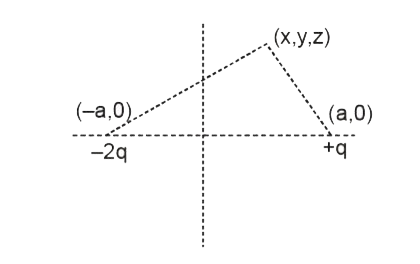Find out equipotential surface where potential is zero ?

Video Solution
Text Solution
squaring both sides
|
Updated on:21/07/2023
Topper's Solved these Questions
- BOOK - MOTIONCHAPTER - ELECTROSTATICS - I EXERCISE - EXERCISE - 1 (Section A)10videos
ELECTROSTATICS - I
- BOOK - MOTIONCHAPTER - ELECTROSTATICS - I EXERCISE - EXERCISE - 1 (Section B)10videos
ELECTROSTATICS - I
- BOOK - MOTIONCHAPTER - ELECTROSTATICSEXERCISE - Exercise -3 Section (B) Previous Year Problems | JEE Main30videos
ELECTROSTATICS
- BOOK - MOTIONCHAPTER - ELECTROSTATICS-IIEXERCISE - Exercise - 4 (Level - II)30videos
ELECTROSTATICS-II
Similar Questions
Knowledge Check
- Question 1 - Select One or More
Equipotential surfaces
Aare closer in regions of large electric fields compared to regions of lower electric fieldsBwill be more crowded near sharp edges of a conductor.Cwill be more crowded near regions of large charge densitiesDwill aways be equally spaced - Question 2 - Select One
An infinite sheet of charge has surface charge density σ . The separation between two equipotential surfaces, whose potential differ by V is:
AσV2∈0B2∈0VσC∈0VσD2σ∈0V - Question 3 - Select One or More
S1 and S2 are two equipotential surfaces on which the potentials are not equal
AS1 and S2 cannot intersect.BS1 and S2 cannot both be plane surfaces.CIn the region between S1 and S2 the field is maximum where they are closest to each other.DA line of force from S1 and S2 must be perpendicular to both.
Draw equipotential surface for a dipole.
View SolutionWork done in carrying an electron from A to B lying on an equipotential surface of one volt potential is
View SolutionLines of force cut equipotential surface
View SolutionIn an equipotential surface, the value of potential at all points on the
View SolutionAssertion: Electric field is aways directed perpendicular to an equipotential surface.
Reason: Equipotential surface is a surface on which at each point potential is same.View Solution
